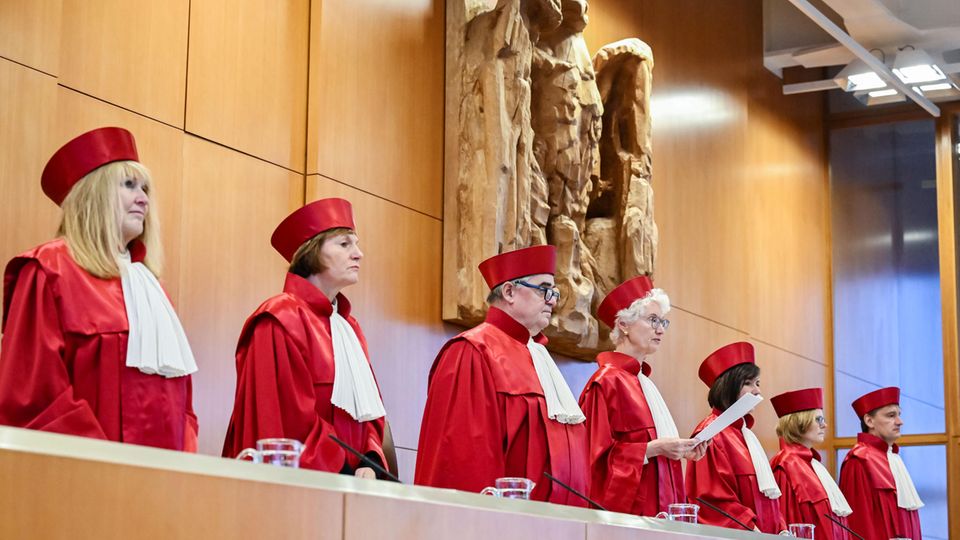analysis
reform
Does the new voting law violate the Basic Law?
The Bundestag has met in the Reichstag building in Berlin since 1999
© Jens Kalaene / DPA
The Federal Constitutional Court must decide whether the new electoral law can be implemented as planned. It is also about the existence of smaller parties in parliament – and about power in Germany.
For two days, Germany’s highest court will hear lawsuits against the new voting law. The Second Senate’s decision could have enormous implications for the 2025 federal election and the parliamentary system as a whole. The oral hearing on Tuesday and Wednesday will therefore be held under particular political attention. We answer the most important questions and answers.
What is it about?
The latest reform of the federal election law, which was implemented by the traffic light coalition in June 2023 against the protest of the opposition from the CDU/CSU, AfD and the Left, is being complained about. The amended law limits the size of Parliament, which currently has 734 members, to 630 seats. In order to achieve this goal, the In the Bundestag election next year, all overhang and compensation mandates will be abolished and so-called caps will be introduced for the number of constituency representatives. At the same time, the direct mandate clause is no longer applicable.
What are overhang and compensation mandates?
They are a consequence of the special electoral system in Germany. The Federal Republic has combined the proportional representation system that is essentially practiced with the majority voting system that is common in the USA or Great Britain, for example. In this personalized proportional representation there are two votes. The first vote elects the representative in the respective constituency. Whoever receives the most votes is elected. The second vote chooses the party list. That’s why people often talk about constituency votes and party votes. What’s important is that the second vote result alone determines the party’s strength in parliament. This can lead to mathematical differences with the result of the first votes. They need to be balanced. It used to work like this: If a party won more constituencies than it was entitled to based on the second vote result, then the surplus direct candidates also entered parliament. One then speaks of overhang mandates. The other parties have received a similar number of compensatory mandates since 2013 – with certain reductions. As a result, the distribution of seats based on the second vote should essentially be maintained.
And what was the problem?
In recent elections, the gap between first and second votes has become increasingly clear – which means the number of overhang and compensatory mandates has increased significantly. Parliament was bloated. The old law set the standard size for the Bundestag to have 598 members: 299 from constituencies and 299 from party lists. But in the current parliament, another 134 members sit on overhang or compensatory mandates. According to the new law, they should automatically disappear from 2025.

The Second Senate of the Federal Constitutional Court, from left to right: Rhona Fetzer, Christine Langenfeld, Peter Müller, Doris König (chair), Sibylle Kessal-Wulf, Astrid Wallrabenstein and Thomas Offenloch in autumn 2023 at the announcement of the judgment on federal electoral law 2020
© Uli Deck / DPA
But if there are no more overhang mandates: Can it not happen that a direct candidate wins his constituency – and still doesn’t get into the Bundestag?
Yes. In each country, each party receives a quota of seats based on its second vote result. If the party wins more constituencies than the mandate quota allows for, under the new law direct mandates that were won particularly narrowly will no longer apply. To ensure that this does not happen too often, the total number of second-vote mandates was increased, bringing the total size of the Bundestag to 630 seats. So there is some wiggle room.
Why was the direct mandate clause abolished?
This clause previously regulated an exception to the 5 percent hurdle. A party that failed because of this still entered the Bundestag based on its second vote result if it had won at least three constituencies. It is only because of this option that the Left Party, for example, currently sits in the Bundestag, which won three direct mandates in 2021. She is now at great risk. But also the The CSU, which only runs in Bavaria but has always won enough direct mandates, could get into difficulties without the direct mandate clause. In an extreme case, the CSU could win all direct mandates in Bavaria, but not take any of them if it fails to meet the five percent hurdle in the second federal vote. The mandates would then be distributed to other countries, leading to a regional imbalance. In 2021, the CSU received 5.2 percent of the second votes. The traffic light justifies the fact that the exception was abolished with the supposedly weakened importance of the constituency vote.
Who sued against the reform?
It concerns two regulatory control proceedings, three organ dispute proceedings and two constitutional complaints. The Bavarian state government (CSU, Free Voters), 195 members of the Bundestag from the Union faction, the CSU and Left parties as well as the former Left faction – and more than 4,000 private individuals have sued. It is said that the capping system violates the majority rule and thus the constitutionally enshrined principle of democracy. Constituency representatives also served as a counterweight to the dominant position of the parties.
That is why the CSU and the Left argue that their right to equal voting rights and equal opportunities between parties is affected. But it is also possible to lower the 5 percent hurdle.
What are the chances that the court will declare the traffic light legislation unconstitutional?
In the recent past, the Federal Constitutional Court has emphasized the primacy of proportional representation. The majority of judges are therefore likely to appreciate that the second vote was even strengthened by the reform. On the other hand, political legitimacy is weakened if some constituencies can no longer provide direct representatives and the first votes there are de facto forfeited. However, the Federal Election Act could also be declared unconstitutional for formal reasons. Several members of the Bundestag complained that the nature and speed of the amendment violated their parliamentary rights.



